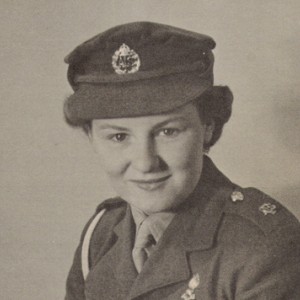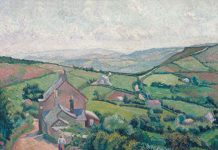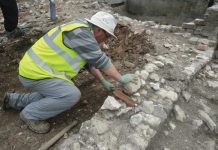Mrs Pat Brunsdon and her family moved to Axminster in the early sixties where she worked in a radio and record shop and later in the town’s TIC. After retirement she was well known as an active member of several local voluntary organisations. After her death in Axminster hospital in 1995 her diaries of her time in the wartime ATS were found by her sons. An edited account of her interesting experiences I feel well worthy of recording and appears as follows: –
When war was declared in September 1939 my mother declared “Thank God I have two girls”. Little did she know where the course of the war would take me during the following months. Anxious to do my bit for the war effort I got a job in a local factory fitting filaments in electric light bulbs but my patriotism began to wane with the fiddly nature of the job. “You will be wearing glasses like the rest of us in a few months’ time,” I was told by a workmate in her broad Yorkshire accent. Having to wear oversize blue overalls and suffer the racket of surrounding factory machines didn’t help either so I gave in my notice. I was then told that in doing so I would have to face a tribunal, employment in national service was bound within strict rules. Terrified, and without telling my parents, I went to the local recruiting office. It was a shattering experience. I was given a medical, first to see if I had VD, then to make sure I was not pregnant. I was mortified, how dare they suggest I might be a girl of easy virtue! After signing some forms I was given the King’s shilling and told that I would be notified. I was nineteen years old.
Then I had to go home to face my parents. Dad took it quite well despite previous warnings he had given me that I would end up peeling spuds and cleaning toilets. Mother did not, we had lost my sister, she had fallen sick and died in September 1940, a shattering experience for us all. She was not going to lose another. I should stay home and keep her company. This I could not do, conscription was coming anyway and I wished to be in the thick of all that was going on.
My call-up papers eventually arrived. I was to report to Glen Parva Barracks, Leicester in January 1941. My parents took me to the train; I was in a lovely suit, Bomberg silk stockings and felt very smart. There were tears as the train pulled out, I was off to war, all 5ft 1 in of me.
On arrival at the barracks we were taken to the stores. What an experience that was. In one end in my smart suit and out the other in a khaki skirt, much too long, a tunic which fitted nowhere and a cap which sat stupidly on top of your head. There was a mirror at the end of the corridor. I could not believe I was the same person; it was very funny, we all looked like characters in a cartoon strip.
I went to bed in a Nissen hut on a hard mattress and have never been so cold in all my life. I felt homesick, but not for anything would I have admitted this to anyone, least of all my parents.
It took all of six weeks to get us into shape. Drilling, route marching, PT, spit and polishing for early morning hut inspections, falling exhausted into bed aching in every limb. After final assessments we were told we had the option of leaving and returning home. Not one girl from the intake wanted to do so. We were all beginning to enjoy army life and felt it would be a worthwhile job. Eventually our postings were announced. My fellow Yorkshire friend and I were to be telephonists and were to report to Oswestry.
On arrival at the camp we were issued with trousers, boots, gaiters, leather jerkin and waterproof capes. What do telephonists do with such kit we wondered? The next morning we arrived on parade in our skirts, tunics, shoes and stockings. There were hundreds of girls on parade dressed in trousers, battle dress blouses and brown boots who were regarding our presence with some curiosity. The Junior Commander told us that we must dress like everyone else; we had joined the Royal Artillery and would be joining a heavy ack-ack gun site. Battle dress and brown boots were, therefore, to be worn.
After technical lectures, aircraft recognition instruction, more lectures, table tennis, dances and going to the pictures in the big cinema on the camp we were given some leave. When we returned we were issued with more strange clothing, steel helmet, gas mask, ground sheet, and also field dressings. We were then posted to a gun site. There we found big 4.5in guns, range finders, predictors and a command post. We stood in the gun pits with cotton wool stuffed in our ears to get used to the noise. Our real war work had finally started. Being telephonists we worked in the command post underground, eight hours on eight hours off, all around the clock.
Our Gunnery Officer decided that I should go on a course to become a predictor operator. Our male Sergeant instructor was rather sarcastic about this saying I hadn’t a hope of passing the course. To his and my own astonishment I did pass and was promoted to the rank of Corporal. I felt very proud as I marched my girls from our tents to the gun site and back again. We lived under canvas and moved around the south London area of Bromley, Petts Wood, Chislehurst and St Mary Cray, working continuously to bring down the dreaded Doodlebug.
In late 1944, with the Allied forces making headway towards Germany we were disbanded and reformed. It was all very hush-hush and there was a lot of drilling to keep everyone occupied. Christmas came and there was no leave. Instead we embarked on a ship in Tilbury Docks one dark and very stormy night. By this time I had received my third stripe, I found it very hard to control the turmoil in my stomach during that voyage, after all an ATS Sergeant could not be seen in the throes of seasickness by her girls.
We arrived in Ostend and were loaded into some very uncomfortable lorries driven by some very fine-looking Royal Marines. We were to relieve an all male battery that was being moved further into Holland. This gun battery was right in the middle of Antwerp. As we drove in we did so below a huge firework display, a terrible air raid was happening and every gun was firing. We must have been the first ATS girls to be under fire. I thought I would never see England again.
Our quarters were awful. No water, no wood for the fires, and we had to sleep rough that first night. In the morning, I and a fellow Sergeant gathered our girls together, all seventy of them, and marched them to the Royal Marine HQ, gathering any wood we could find for our stoves. The sentry at the entrance appeared very puzzled by the arrival of a bunch of girls, rosy-faced with cold and wearing boots and gaiters, leather jerkins and woolly scarves. He sent for a senior NCO who, in turn, called the Duty Officer. I explained our situation and that we would all appreciate a hot drink. He sent us off to the mess hall where we found a crowd of very surprised soldiers, sailors and marines.
After the very welcome refreshment happily given us the girls, naturally, began to want to spend a penny. I sought out the Duty Officer and asked if there was a ladies toilet. “Good God girl, this is a man’s war!” he declared irritably. However, he softened and directed us to the officers’ mess. As I waited for the girls in the hall a handsome Royal Marine Warrant Officer strode in. He asked me who I was. I told him I was an ATS Sergeant in the Royal Artillery. “What. Girls on guns?”
The following day we got our equipment in order, did our maintenance and reported “Ready for Action”. From then on our guns were constantly firing and, I believe, we were the first British women to directly engage the enemy in action. We brought down many Doodlebugs and spent the rest of the war in Belgium where we celebrated VE Day in Antwerp, which was wonderful. Then we dismantled the equipment and finally home and demobilisation.
I married that handsome Marine and am now a grandmother. Not much has been written about the ATS and the wonderful work they did under great stress, discomfort and heavy gunfire. I think we became liberated women all those years ago and certainly did all we could for the war effort.
Derek Stevens is available for talks on the subject of life during World War II. Anyone interested should phone 01297 553765.










